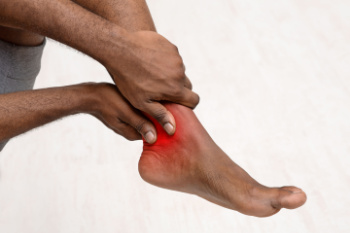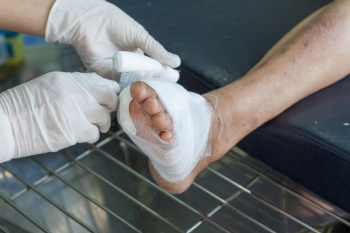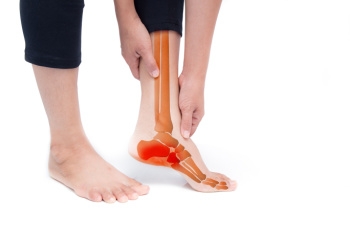Connect With Us
Blog

Ballet foot exercises are vital for warming up, enhancing technique, and building foot strength. Begin with simple foot stretches to improve flexibility and prepare the muscles for intense activity. Point and flex exercises, where you extend and retract your toes, can help to increase your range of motion and strength. Performing demi-pointe and full-pointe exercises strengthens the foot muscles and improves balance. Additionally, toe rises and relevés, where you lift onto the balls of your feet, contribute to greater control and stability. Incorporating resistance bands into your routine can further enhance strength and flexibility. If you have developed a foot condition from not warming up properly before practicing ballet moves, it is suggested that you confer with a podiatrist who can treat any foot condition, and guide you on practicing correct foot stretches.
Exercising your feet regularly with the proper foot wear is a great way to prevent injuries and build strength. If you have any concerns about your feet, contact one of our podiatrists from Greater Boston Foot Care, PLLC. Our doctors can provide the care you need to keep you pain-free and on your feet.
Exercise for Your Feet
Exercise for your feet can help you gain strength, mobility and flexibility in your feet. They say that strengthening your feet can be just as rewarding as strengthening another part of the body. Your feet are very important, and we often forget about them in our daily tasks. But it is because of our feet that are we able to get going and do what we need to. For those of us fortunate enough to not have any foot problems, it is an important gesture to take care of them to ensure good health in the long run.
Some foot health exercises can include ankle pumps, tip-toeing, toe rises, lifting off the floor doing reps and sets, and flexing the toes. It is best to speak with Our doctors to determine an appropriate regimen for your needs. Everyone’s needs and bodies are different, and the activities required to maintain strength in the feet vary from individual to individual.
Once you get into a routine of doing regular exercise, you may notice a difference in your feet and how strong they may become.
If you have any questions please feel free to contact our office located in Plymouth, MA . We offer the newest diagnostic and treatment technologies for all your foot and ankle needs.

Flat feet in children is a condition where the arches of the feet do not develop properly. Common signs include foot pain, especially after prolonged activity, and an abnormal walking pattern. Children with flat feet might also experience frequent fatigue or discomfort during sports and play. Additionally, flat feet can lead to awkward or uneven wear on shoes. The causes of flat feet can be congenital, where the condition is present from birth, or acquired, resulting from factors like weak arches or improper footwear. Ligament laxity or developmental issues can also contribute to flat feet. Early identification and appropriate management are critical to minimize discomfort and ensure proper development. If your child's arches fail to develop it is strongly suggested that you consult a podiatrist who can help monitor this sometimes painful condition.
Flatfoot is a condition many people suffer from. If you have flat feet, contact one of our podiatrists from Greater Boston Foot Care, PLLC. Our doctors will treat your foot and ankle needs.
What Are Flat Feet?
Flatfoot is a condition in which the arch of the foot is depressed and the sole of the foot is almost completely in contact with the ground. About 20-30% of the population generally has flat feet because their arches never formed during growth.
Conditions & Problems:
Having flat feet makes it difficult to run or walk because of the stress placed on the ankles.
Alignment – The general alignment of your legs can be disrupted, because the ankles move inward which can cause major discomfort.
Knees – If you have complications with your knees, flat feet can be a contributor to arthritis in that area.
Symptoms
- Pain around the heel or arch area
- Trouble standing on the tip toe
- Swelling around the inside of the ankle
- Flat look to one or both feet
- Having your shoes feel uneven when worn
Treatment
If you are experiencing pain and stress on the foot you may weaken the posterior tibial tendon, which runs around the inside of the ankle.
If you have any questions please feel free to contact our office located in Plymouth, MA . We offer the newest diagnostic and treatment technologies for all your foot and ankle needs.
 Juvenile arthritis, also known as juvenile idiopathic arthritis or JIA, is a chronic inflammatory condition that affects children under the age of 16. This autoimmune disorder can impact various joints, including those in the feet, leading to pain, swelling, stiffness, and reduced mobility. Early signs in the feet may include limping, reluctance to walk, or swelling surrounding the ankles and toes. The inflammation associated with JIA can damage cartilage and bone, causing long-term joint issues if not managed properly. Children with JIA may experience difficulty participating in physical activities, impacting their overall quality of life. Treatment for juvenile arthritis in the feet includes a combination of medication to reduce inflammation and pain, exercises to maintain joint function and mobility, and custom orthotics to provide support and alleviate pressure on affected joints. If your child has JIA, it is strongly suggested that you include a podiatrist among the healthcare team for regular check-ups that are essential for monitoring this condition and adjusting treatment plans.
Juvenile arthritis, also known as juvenile idiopathic arthritis or JIA, is a chronic inflammatory condition that affects children under the age of 16. This autoimmune disorder can impact various joints, including those in the feet, leading to pain, swelling, stiffness, and reduced mobility. Early signs in the feet may include limping, reluctance to walk, or swelling surrounding the ankles and toes. The inflammation associated with JIA can damage cartilage and bone, causing long-term joint issues if not managed properly. Children with JIA may experience difficulty participating in physical activities, impacting their overall quality of life. Treatment for juvenile arthritis in the feet includes a combination of medication to reduce inflammation and pain, exercises to maintain joint function and mobility, and custom orthotics to provide support and alleviate pressure on affected joints. If your child has JIA, it is strongly suggested that you include a podiatrist among the healthcare team for regular check-ups that are essential for monitoring this condition and adjusting treatment plans.
Arthritis can be a difficult condition to live with. If you are seeking treatment, contact one of our podiatrists from Greater Boston Foot Care, PLLC. Our doctors can provide the care you need to keep you pain-free and on your feet.
Arthritic Foot Care
Arthritis is a joint disorder that involves the inflammation of different joints in your body, such as those in your feet. Arthritis is often caused by a degenerative joint disease and causes mild to severe pain in all affected areas. In addition to this, swelling and stiffness in the affected joints can also be a common symptom of arthritis.
In many cases, wearing ill-fitting shoes can worsen the effects and pain of arthritis. Wearing shoes that have a lower heel and extra room can help your feet feel more comfortable. In cases of rheumatoid arthritis, the arch in your foot may become problematic. Buying shoes with proper arch support that contour to your feet can help immensely.
Alleviating Arthritic Pain
- Exercises that stretch the foot can prevent further pain and injury and increase mobility
- Most of the pain can be alleviated with anti-inflammatory drugs, heat, and topical medications
- Massages can help temporarily alleviate pain.
It is best to see your doctor for the treatment that is right for your needs and symptoms. Conditions vary, and a podiatrist can help you determine the right method of care for your feet.
If you have any questions, please feel free to contact our office located in Plymouth, MA . We offer the newest diagnostic tools and technology to treat your foot and ankle needs.

Peripheral artery disease, or PAD, affects blood circulation, often manifesting through symptoms related to the feet. Common signs include cramping, pain, or numbness in the feet during physical activity, which subsides with rest. Coldness or discoloration of the feet or toes, particularly in comparison to the unaffected leg, may also occur due to reduced blood flow. Slow-healing wounds or sores on the feet are another indicator, as PAD limits the delivery of oxygen and nutrients essential for tissue repair. PAD, caused by narrowed arteries due to plaque buildup, increases the risk of complications, such as infections and tissue death in severe cases. Regular foot exams from a podiatrist are essential for managing PAD. If you have symptoms of PAD, it is suggested that you are under the care of this type of doctor who can help you to manage this condition.
Peripheral artery disease can pose a serious risk to your health. It can increase the risk of stroke and heart attack. If you have symptoms of peripheral artery disease, consult with one of our podiatrists from Greater Boston Foot Care, PLLC. Our doctors will assess your condition and provide you with quality foot and ankle treatment.
Peripheral artery disease (PAD) is when arteries are constricted due to plaque (fatty deposits) build-up. This results in less blood flow to the legs and other extremities. The main cause of PAD is atherosclerosis, in which plaque builds up in the arteries.
Symptoms
Symptoms of PAD include:
- Claudication (leg pain from walking)
- Numbness in legs
- Decrease in growth of leg hair and toenails
- Paleness of the skin
- Erectile dysfunction
- Sores and wounds on legs and feet that won’t heal
- Coldness in one leg
It is important to note that a majority of individuals never show any symptoms of PAD.
Diagnosis
While PAD occurs in the legs and arteries, Podiatrists can diagnose PAD. Podiatrists utilize a test called an ankle-brachial index (ABI). An ABI test compares blood pressure in your arm to you ankle to see if any abnormality occurs. Ultrasound and imaging devices may also be used.
Treatment
Fortunately, lifestyle changes such as maintaining a healthy diet, exercising, managing cholesterol and blood sugar levels, and quitting smoking, can all treat PAD. Medications that prevent clots from occurring can be prescribed. Finally, in some cases, surgery may be recommended.
If you have any questions, please feel free to contact our office located in Plymouth, MA . We offer the newest diagnostic and treatment technologies for all your foot care needs.

Maintaining proper foot hygiene is essential for overall health and comfort. Everyday foot care can begin with regularly washing feet with soap and water. This can help to remove dirt and bacteria, reducing the risk of infections. Thoroughly drying feet, especially between the toes, prevents fungal growth. Wearing clean, moisture-wicking socks can keep feet dry and comfortable throughout the day. Properly fitting shoes that provide adequate support can help to prevent blisters and calluses. Regularly trimming toenails straight across reduces the risk of ingrown nails. Moisturizing feet daily keeps skin supple and prevents cracks. Checking feet for any cuts, blisters, or changes in appearance can catch potential issues early. Foot conditions may develop from a lack of proper foot care. If this applies to you, it is suggested that you consult a podiatrist who can treat any foot ailment, and guide you on effective foot care routines.
Everyday foot care is very important to prevent infection and other foot ailments. If you need your feet checked, contact one of our podiatrists from Greater Boston Foot Care, PLLC. Our doctors can provide the care you need to keep you pain-free and on your feet.
Everyday Foot Care
Often, people take care of their bodies, face and hair more so than they do for their feet. But the feet are a very important aspect of our bodies, and one that we should pay more attention to. Without our feet, we would not be able to perform most daily tasks.
It is best to check your feet regularly to make sure there are no new bruises or cuts that you may not have noticed before. For dry feet, moisturizer can easily be a remedy and can be applied as often as necessary to the affected areas. Wearing shoes that fit well can also help you maintain good foot health, as well as making it easier to walk and do daily activities without the stress or pain of ill-fitting shoes, high heels, or even flip flops. Wearing clean socks with closed shoes is important to ensure that sweat and bacteria do not accumulate within the shoe. Clean socks help to prevent Athlete’s foot, fungi problems, bad odors, and can absorb sweat.
If you have any questions please feel free to contact our office located in Plymouth, MA . We offer the newest diagnostic and treatment technologies for all your foot and ankle needs.

Whether seeking greater control over your workout or avoiding unpredictable weather, treadmill running offers a convenient alternative to outdoor running. Using a dedicated pair of treadmill shoes for indoor runs not only protects your feet but also enhances your workout experience. Despite the treadmill’s ability to mimic outdoor running, there are significant differences between running on a machine and running on the road or trail. Outdoor terrain features various surfaces and elevations, whereas treadmills provide a uniformly flat and predictable environment. For that reason, treadmill runners should prioritize shoes that excel in breathability, lightweight design, and cushioning to ensure maximum comfort and efficiency. The repetitive nature of treadmill running can overwork some stabilizer muscles while underutilizing others. Adequate midsole cushioning alleviates these repetitive impacts and provides energy return to keep you going strong. Too much cushioning can make your shoes feel unstable. If you are experiencing a foot problem after running on a treadmill, it is suggested that you make an appointment with a podiatrist for an exam and expert treatment.
You should always make sure your running shoes fit properly in order to avoid injury. For more information, contact one of our podiatrists from Greater Boston Foot Care, PLLC. Our doctors can provide the care you need to keep you pain-free and on your feet.
Choosing the Right Running Shoe for Your Foot Type
Improper shoe sizing can cause a myriad of problems for your feet. Shoes that don’t fit you properly can lead to muscular imbalances in your body, which can result in foot, knee, and hip injuries.
Tips for Finding the Right Running Shoe
- Make sure you have a thumb’s width of wiggle room between the end of your longest toe and the front of the shoe.
- There should be little to no slipping at the heel
- Don’t assume your size in one shoe brand will be your size in another
- Do not lace up your shoes too tightly
- Walk around in the store with your new shoes before you buy them
If you have any questions please feel free to contact our our office located in Plymouth, MA . We offer the newest diagnostic and treatment technologies for all your foot and ankle needs.
 Diabetic foot wounds are common complications resulting from a combination of poor circulation and neuropathy, which reduces sensation in the feet. Risk factors can include prolonged high blood sugar levels, which damage blood vessels and nerves, and wearing ill-fitting shoes, which can cause blisters and sores. People with diabetes are more prone to infections due to a weakened immune response. Proper foot care is essential to prevent these wounds. Daily inspections for cuts, blisters, or any changes in skin color are vital. Keeping feet clean and dry, moisturizing to prevent cracking, and wearing comfortable, protective shoes are essential steps. Regular visits to a podiatrist for foot examinations and managing blood sugar levels effectively can also reduce the risk of severe complications. If you have diabetes, it is strongly suggested that you are under the care of a podiatrist who can help you to manage this condition.
Diabetic foot wounds are common complications resulting from a combination of poor circulation and neuropathy, which reduces sensation in the feet. Risk factors can include prolonged high blood sugar levels, which damage blood vessels and nerves, and wearing ill-fitting shoes, which can cause blisters and sores. People with diabetes are more prone to infections due to a weakened immune response. Proper foot care is essential to prevent these wounds. Daily inspections for cuts, blisters, or any changes in skin color are vital. Keeping feet clean and dry, moisturizing to prevent cracking, and wearing comfortable, protective shoes are essential steps. Regular visits to a podiatrist for foot examinations and managing blood sugar levels effectively can also reduce the risk of severe complications. If you have diabetes, it is strongly suggested that you are under the care of a podiatrist who can help you to manage this condition.
Diabetic foot care is important in preventing foot ailments such as ulcers. If you are suffering from diabetes or have any other concerns about your feet, contact one of our podiatrists from Greater Boston Foot Care, PLLC. Our doctors can provide the care you need to keep you pain-free and on your feet.
Diabetic Foot Care
Diabetes affects millions of people every year. The condition can damage blood vessels in many parts of the body, especially the feet. Because of this, taking care of your feet is essential if you have diabetes, and having a podiatrist help monitor your foot health is highly recommended.
The Importance of Caring for Your Feet
- Routinely inspect your feet for bruises or sores.
- Wear socks that fit your feet comfortably.
- Wear comfortable shoes that provide adequate support.
Patients with diabetes should have their doctor monitor their blood levels, as blood sugar levels play such a huge role in diabetic care. Monitoring these levels on a regular basis is highly advised.
It is always best to inform your healthcare professional of any concerns you may have regarding your feet, especially for diabetic patients. Early treatment and routine foot examinations are keys to maintaining proper health, especially because severe complications can arise if proper treatment is not applied.
If you have any questions please feel free to contact our office located in Plymouth, MA . We offer the newest diagnostic and treatment technologies for all your foot and ankle needs.
 Peripheral neuropathy is a condition resulting from damage to the peripheral nerves, which connect the brain and spinal cord to the rest of the body. It often occurs due to diabetes, infections, injuries, or exposure to toxins. Diagnosis involves a thorough medical history review, physical examination, and tests like nerve conduction studies, electromyography, or EMGs, and blood tests to determine underlying causes. Symptoms can include numbness, tingling, burning sensations, and pain, usually starting in the hands and feet. Muscle weakness and sensitivity to touch are also common. These symptoms can lead to complications like balance problems, foot ulcers, and infections due to unnoticed injuries. Treatment focuses on managing the underlying cause, relieving symptoms, and preventing complications. This may include medications, gentle exercises, and lifestyle changes such as improving diet and controlling blood sugar levels. If you have peripheral neuropathy, it is suggested that you visit a podiatrist for a proper diagnosis and management.
Peripheral neuropathy is a condition resulting from damage to the peripheral nerves, which connect the brain and spinal cord to the rest of the body. It often occurs due to diabetes, infections, injuries, or exposure to toxins. Diagnosis involves a thorough medical history review, physical examination, and tests like nerve conduction studies, electromyography, or EMGs, and blood tests to determine underlying causes. Symptoms can include numbness, tingling, burning sensations, and pain, usually starting in the hands and feet. Muscle weakness and sensitivity to touch are also common. These symptoms can lead to complications like balance problems, foot ulcers, and infections due to unnoticed injuries. Treatment focuses on managing the underlying cause, relieving symptoms, and preventing complications. This may include medications, gentle exercises, and lifestyle changes such as improving diet and controlling blood sugar levels. If you have peripheral neuropathy, it is suggested that you visit a podiatrist for a proper diagnosis and management.
Neuropathy
Neuropathy can be a potentially serious condition, especially if it is left undiagnosed. If you have any concerns that you may be experiencing nerve loss in your feet, consult with one of our podiatrists from Greater Boston Foot Care, PLLC. Our doctors will assess your condition and provide you with quality foot and ankle treatment for neuropathy.
What Is Neuropathy?
Neuropathy is a condition that leads to damage to the nerves in the body. Peripheral neuropathy, or neuropathy that affects your peripheral nervous system, usually occurs in the feet. Neuropathy can be triggered by a number of different causes. Such causes include diabetes, infections, cancers, disorders, and toxic substances.
Symptoms of Neuropathy Include:
- Numbness
- Sensation loss
- Prickling and tingling sensations
- Throbbing, freezing, burning pains
- Muscle weakness
Those with diabetes are at serious risk due to being unable to feel an ulcer on their feet. Diabetics usually also suffer from poor blood circulation. This can lead to the wound not healing, infections occurring, and the limb may have to be amputated.
Treatment
To treat neuropathy in the foot, podiatrists will first diagnose the cause of the neuropathy. Figuring out the underlying cause of the neuropathy will allow the podiatrist to prescribe the best treatment, whether it be caused by diabetes, toxic substance exposure, infection, etc. If the nerve has not died, then it’s possible that sensation may be able to return to the foot.
Pain medication may be issued for pain. Electrical nerve stimulation can be used to stimulate nerves. If the neuropathy is caused from pressure on the nerves, then surgery may be necessary.
If you have any questions, please feel free to contact our office located in Plymouth, MA . We offer the newest diagnostic and treatment technologies for all your foot care needs.
Blog Archives
- 2025
- 2024
- 2023


